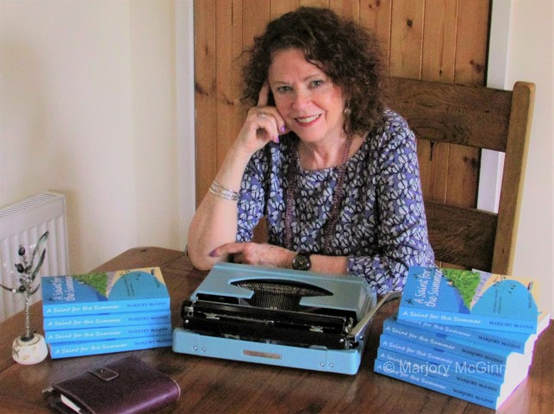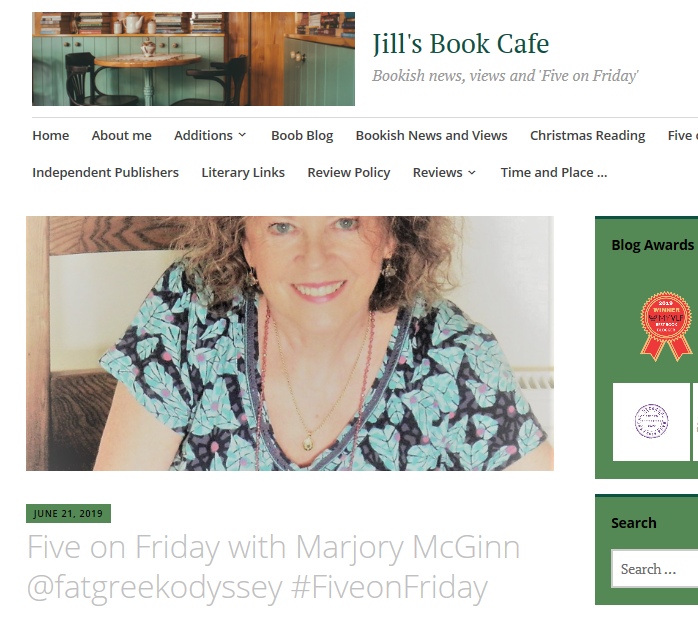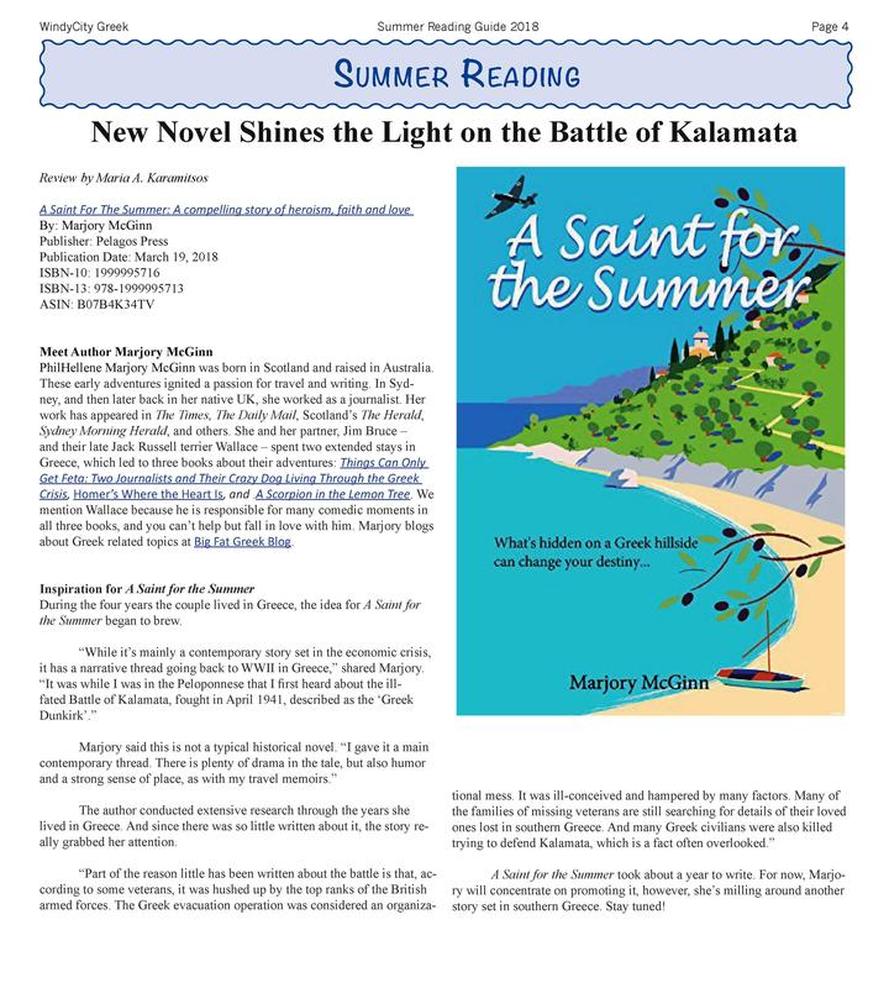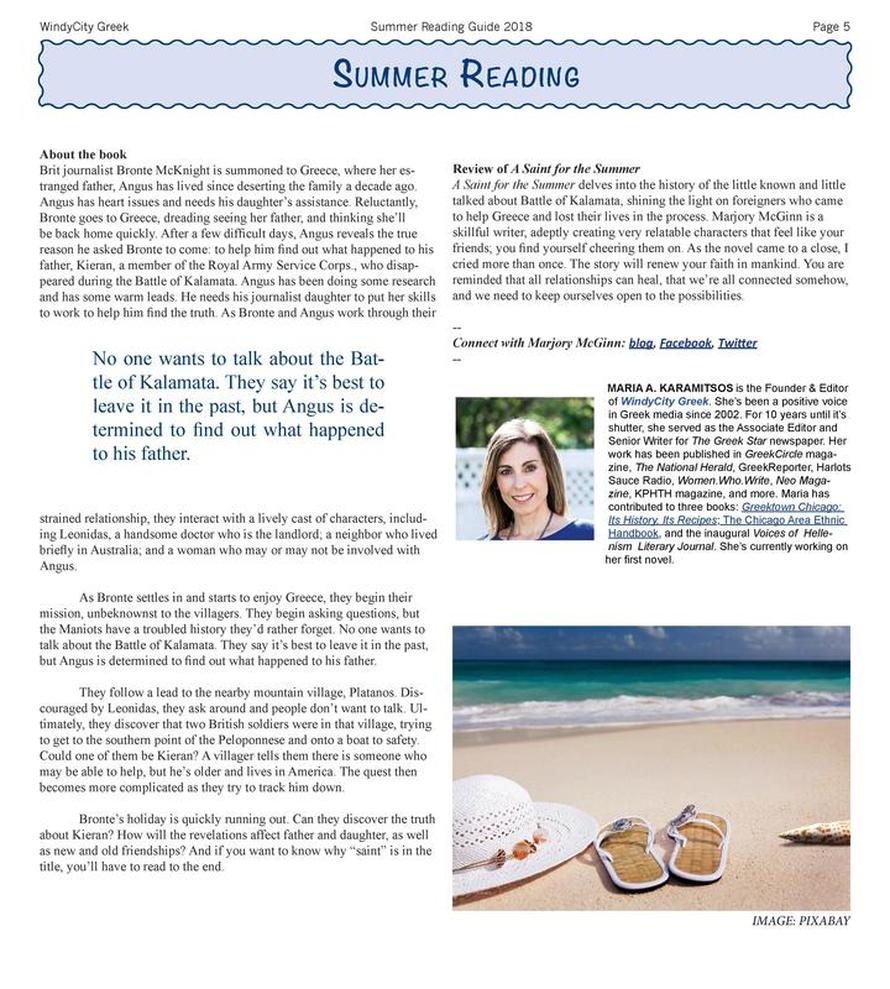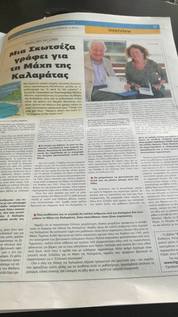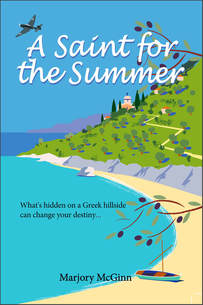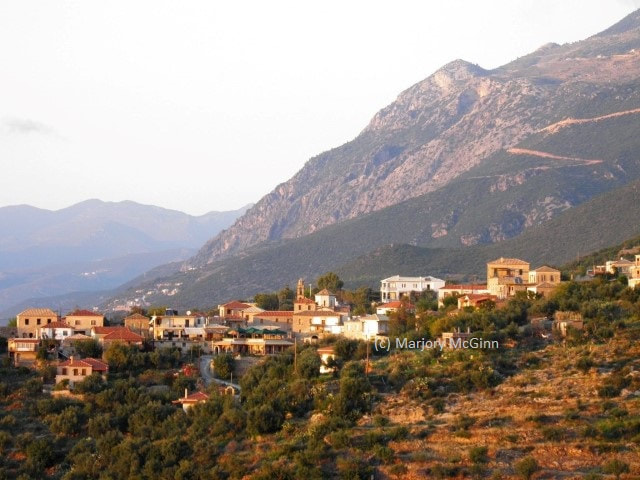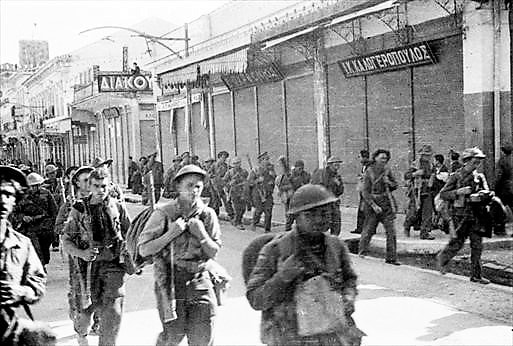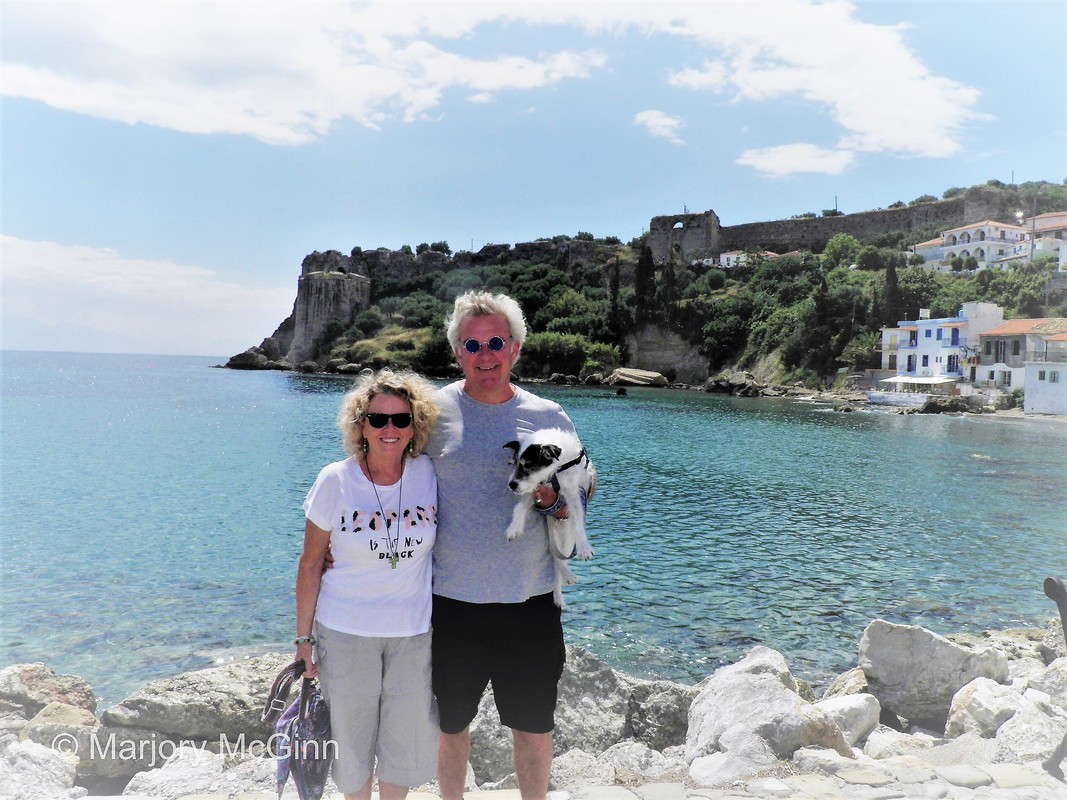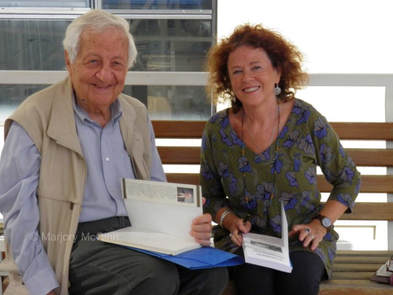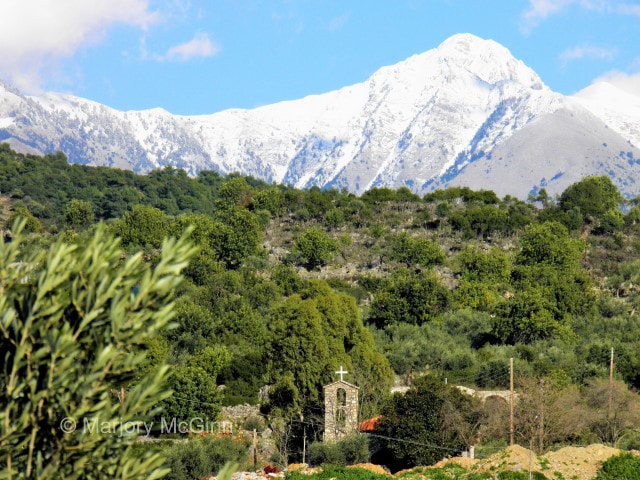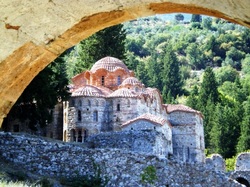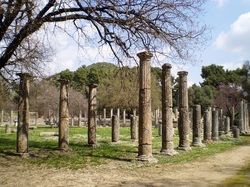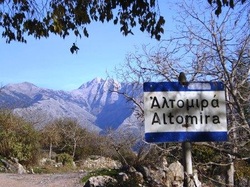Author interviews
Here are a selection of recent interviews and reviews about Marjory’s two novels, A Saint For The Summer and How Greek Is Your Love?
(For interviews about her four Greek travel memoirs, see the books page on this website).
(For interviews about her four Greek travel memoirs, see the books page on this website).
Interview with Marjory on Talk Radio Europe: September 2020
Revealing interview with Jill Doyle on her award-winning site Jill's Book Café:
Interview by Maria Karamitsos on Windy City Greek, the Chicago-based online magazine:
- To read the full Greek books Summer Reading 2018 guide, click HERE
1: When you visited Greece for the first time (around the age of 20), what was it that you loved so much about the country that finally inspired your books?
Everything! When I first went to Athens as a young woman, I fell in love with the place the minute I stepped off an overland bus. I had come for a long holiday but ended up staying in Athens a year. What I loved about it was hard to define, a mixture of things that seemed incredibly exotic: the kafeneia, the old markets around Monastiraki, the old people dressed in black, the richness of the language, the vibrancy of the culture. I loved it all. I wasn’t there by chance though because after I emigrated to Australia from Scotland as a child in the 1960s, my first friend at school in Sydney was a Greek girl, Anna, and I spent a lot of time with her and her family, and summer holidays. I became almost part of her family and when I left Australia for my overseas adventure it was Greece I was always heading for. Greece has inspired me all my life but it wasn’t until I went to live in the Mani in 2010 that I decided to write books with a Greek theme.
Everything! When I first went to Athens as a young woman, I fell in love with the place the minute I stepped off an overland bus. I had come for a long holiday but ended up staying in Athens a year. What I loved about it was hard to define, a mixture of things that seemed incredibly exotic: the kafeneia, the old markets around Monastiraki, the old people dressed in black, the richness of the language, the vibrancy of the culture. I loved it all. I wasn’t there by chance though because after I emigrated to Australia from Scotland as a child in the 1960s, my first friend at school in Sydney was a Greek girl, Anna, and I spent a lot of time with her and her family, and summer holidays. I became almost part of her family and when I left Australia for my overseas adventure it was Greece I was always heading for. Greece has inspired me all my life but it wasn’t until I went to live in the Mani in 2010 that I decided to write books with a Greek theme.
|
2: Most people - at the time you decided with your partner to come to Greece - were thinking to go abroad because of the economic crisis. Did you ever have doubts about this 'crazy' idea?
We had some doubts because when we planned our Greek odyssey for 2010, the economic crisis had just started and we had no idea if we could live there, and also work, doing freelance journalism for British newspapers, as my partner Jim and I were both journalists. It was our friends and family who thought we were really crazy, especially since we also planned to take our dog Wallace with us, who was very cute but just a bit crazy himself, so we had no idea if we would be able to rent a suitable house. But we had faith in Greek people and knew that whatever fate threw our way there would be people to help us. They did more than that. When we went to live in the hillside village of Megali Mantineia (pictured right) they embraced us as friends and we met many wonderful people, whom I wrote about in my three travel memoirs, the first of which was Things Can Only Get Feta. |
|
3: The story of A Saint For The Summer unfolds in the province of Mani. Do you believe that the fact you were in Mani at the same time as writing the book helped you, inspired you even more?
Yes I think so. The book is a contemporary story about a young Scottish woman trying to help her father who lives in the Mani and whom she hasn’t seen much for 10 years. Her father wants her help to solve a family mystery from 1941, when her grandfather Kieran went missing during the Battle of Kalamata in April 1941. It is a family drama, and a romance, but mostly, it revolves around the Battle of Kalamata. I had never heard of this battle before I came to Mani in 2010 but I heard a lot about it from Greek friends mainly while we were living there and how so many British and allied (from Australia, New Zealand etc) soldiers (pictured left in Kalamata) had perished trying to escape after the Germans invaded Greece. It really captured my imagination. I started to construct the plot of the book then but in the meantime, I was also writing my travel memoirs about our time in Greece, so the novel had to wait. |
|
4: Would you come back to Greece for such a long time to write another book or for other reasons?
We stayed for four years during the crisis, which for my partner Jim and me (pictured right with Wallace the Jack Russell) was one of the most interesting and exciting times of our lives. We had to return for many reasons, some personal and we know live in southern England. It would be harder now I think to have that long adventure for a year or more. We don’t own a house in Greece so it means renting long-term, which is not always easy. But we try to come back every year for a long holiday to see Greek friends. I am planning to write another novel set in southern Greece, so I will definitely be back to do more research. I don’t think I could ever cut my links with Greece or Greek people. It has become part of my life now. |
5: Could you imagine yourself living permanently in Greece?
Yes, absolutely, and we did think of it, even during the worst of the crisis. If some of our circumstances were different, I could very easily live in Greece because I love the culture, the lifestyle and I have been learning Greek for quite a few years though it’s still far from perfect. I feel completely at home in Greece and I particularly liked Kalamata and the southern region. I like the warmth of the people, their κεφι and the way they take outsiders, χενοι, into their lives. I like the fact that Greek people put friendship, family, παρεα, above all else. It’s a very civilized, very humanising society and has been, even during the blackest days of the crisis. It’s something that Greek people should all be proud of. During the worst of the crisis in 2012/13, there was much negativity in world’s media about the Greeks. Too much! But no-one is criticising Greek people now. You have all come through this catastrophe with your heads held high.
Yes, absolutely, and we did think of it, even during the worst of the crisis. If some of our circumstances were different, I could very easily live in Greece because I love the culture, the lifestyle and I have been learning Greek for quite a few years though it’s still far from perfect. I feel completely at home in Greece and I particularly liked Kalamata and the southern region. I like the warmth of the people, their κεφι and the way they take outsiders, χενοι, into their lives. I like the fact that Greek people put friendship, family, παρεα, above all else. It’s a very civilized, very humanising society and has been, even during the blackest days of the crisis. It’s something that Greek people should all be proud of. During the worst of the crisis in 2012/13, there was much negativity in world’s media about the Greeks. Too much! But no-one is criticising Greek people now. You have all come through this catastrophe with your heads held high.
|
6: To write a book like yours, based on true historical facts, is very difficult, because lots of research is needed. How difficult was it to gather the information you wanted to find and what was the one that impressed you the most?
I did most of the research for this novel while living in the region, though I didn’t start to write the story properly until I was back in Britain. I did more research in 2017 while on holiday in Kalamata and met up with the lovely writer and historian Nikos Zervis (pictured left with Marjory in Kalamata) several times who talked to me a lot about the Battle and the German occupation. He also inspired me a lot and we still write to each other and have exchanged books. Apart from that, I read a couple of books with accounts by British and allied veterans (survivors) of the Battle and based my story on information given to me by Greeks who remembered the conflict. I was most intrigued by stories about soldiers escaping down the Mani and Messinian peninsulas and how many were hidden by Greek villagers, even up in the mountains. That gave me the idea for the novel, trying to find out what happened to protagonist (Bronte)’s grandfather. I based the villages on those I knew, Megali Mantineia, and Altomira, in the Taygetos Mountains (pictured left), though I changed the names. |
7: How do you feel about the fact that not many people from Kalamata are familiar with the Battle of Kalamata, where so many foreign soldiers were killed?
I think most Greek people of an older age obviously know what happened during the Battle of Kalamata. But I think that many people in the Kalamata area now would be surprised to know how many foreign soldiers were stranded here after the Battle. Around 8,000 British and other soldiers were left behind in April 1941 after the British warships departed. Many soldiers were taken prison of war by the Germans, many others died, and around 300 disappeared down the peninsulas looking for boats to take them to Crete. Many were never seen again. This was the group I was most interested in. But even less is known about the Battle outside of Greece even though some British veterans have described it as the “Greek Dunkirk”. The whole idea of the Battle of Kalamata really gripped my imagination and though it was a lot of work putting this novel together, I thoroughly enjoyed writing it and having the chance to shed some light on this tragic conflict.
I think most Greek people of an older age obviously know what happened during the Battle of Kalamata. But I think that many people in the Kalamata area now would be surprised to know how many foreign soldiers were stranded here after the Battle. Around 8,000 British and other soldiers were left behind in April 1941 after the British warships departed. Many soldiers were taken prison of war by the Germans, many others died, and around 300 disappeared down the peninsulas looking for boats to take them to Crete. Many were never seen again. This was the group I was most interested in. But even less is known about the Battle outside of Greece even though some British veterans have described it as the “Greek Dunkirk”. The whole idea of the Battle of Kalamata really gripped my imagination and though it was a lot of work putting this novel together, I thoroughly enjoyed writing it and having the chance to shed some light on this tragic conflict.
|
* To read the original article in the Kalamata newspaper Eleftheria, online in Greek, please click here.
|
Other interviews about A Saint For The Summer
Interview on the publishing site Birds Of A Feather Press
Interview on writing and travel site Ramblings from Rhodes
Writing and publishing site From First Page to Last
Interview on expat site The Displaced Nation about Marjory's travel memoirs
Interview on writing and travel site Ramblings from Rhodes
Writing and publishing site From First Page to Last
Interview on expat site The Displaced Nation about Marjory's travel memoirs
© Text and photographs copyright of the authors 2010-2025.
No reproduction of text or images without written permission.
No reproduction of text or images without written permission.
